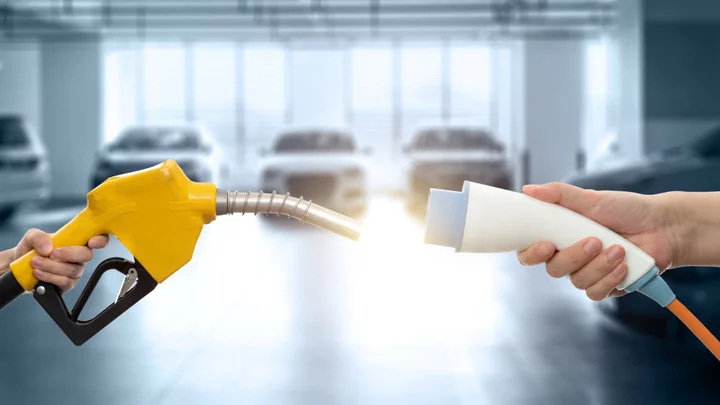The electric vehicle revolution is accelerating, with more Americans than ever looking to move away from fully gas-powered cars, a new study finds.
Ernst & Young (EY) surveyed 15,000 consumers in 20 different countries who intend to buy a vehicle in the next 24 months, as part of its annual Mobility Consumer Index (MCI). The results show that US consumer interest in EVs is at an all-time high: Almost half (48%) say their next car will be a hybrid, plug-in hybrid (PHEV), or fully electric vehicle.
That's up 19% since last year's survey, a bigger jump than in many other countries that were surveyed. "This year's data demonstrates that the US is at a true precipice when it comes to mainstream EV adoption," says Steve Patton, mobility sector leader for EY Americas. "We can expect to see more EVs, both commercial and consumer, on the road."
The US, which has historically lagged behind China and the EU in EV adoption, jumped up five spots on the list—the biggest leap for any country—to number seven. China, Norway, and Sweden hold the top three spots.
Top 10 Countries Ranked by Consumer EV Readiness:
China
Norway
Sweden
Germany
UK
South Korea
US
Netherlands
Spain
France
"These top 10 are based on regulatory (investment for charging and battery ecosystem and targeting ICE phase outs), supply (development of factories and charging infrastructure), and demand (mobility consumer behavior and fleet adoption) factors," Elizabeth Feigenbaum, EY Public Relations Assistant Director, told PCMag.
More survey respondents are interested in a full EV (22%) than a hybrid (15%) or PHEV (12%), the study found. The 48% figure is a combination of all three, representing all consumers with interest in electrification at any level. But remember, this represents purchasing intent only, and fully electric cars still make up just 7% of total new car sales in the US.
Confidence in the performance of fully electric vehicles has grown over the years, the study shows. These days, 29% of US car buyers are considering an EV because they believe EVs outperform internal combustion engine (ICE) vehicles. EVs are known for quicker acceleration, smooth handling, and sophisticated software.
The respondents' number-one concern about going electric is a familiar one: the limited availability of public chargers, which has been a consistent barrier to EV adoption. "Over half (51%) of US consumers are more worried about finding a charging station in nonresidential facilities than expensive charging costs," EY says.
But one surprising charging-related concern also emerged from the survey: Over half (57%) of US respondents cited the dangers of home charging as a key deterrent to owning an EV. This was 10% higher than respondents in other countries, which could suggest it's a matter of perception more than electrical or battery concerns, though both are likely involved.
When it comes to the type of vehicle American buyers are most interested in, their preferences are clear: 38% of respondents prefer SUVs over sedans or other vehicle types.
And more in the US are planning to buy: "In 2023, the share of existing car owners intending to buy new cars in the US showed a 3% increase, with the US showing a significantly higher car-buying intent (12% growth to 60%) compared with the global average (which remained flat year over year at 44%)," the study found.
Sounds like you can expect more electric SUVs to hit the road in the coming years, such as the Tesla Model Y, Volvo EX30, and Hyundai Kona Electric.

